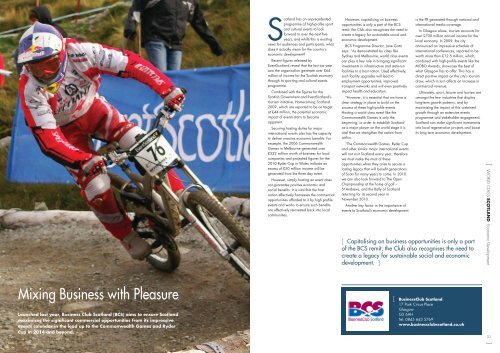2 Economic Development - World Class Scotland
2 Economic Development - World Class Scotland
2 Economic Development - World Class Scotland
Create successful ePaper yourself
Turn your PDF publications into a flip-book with our unique Google optimized e-Paper software.
[<br />
<strong>Scotland</strong> has an unprecedented<br />
programme of high-profile sport<br />
and cultural events to look<br />
forward to over the next five<br />
years, and while this is exciting<br />
news for audiences and participants, what<br />
does it actually mean for the country’s<br />
economic development?<br />
Recent figures released by<br />
Event<strong>Scotland</strong> reveal that the last tax year<br />
saw the organisation generate over £64<br />
million of income for the Scottish economy<br />
through its sporting and cultural events<br />
programme.<br />
Combined with the figures for the<br />
Scottish Government and Event<strong>Scotland</strong>’s<br />
tourism initiative, Homecoming <strong>Scotland</strong><br />
2009, which are reported to be on target<br />
at £44 million, the potential economic<br />
impact of events starts to become<br />
apparent.<br />
Securing hosting duties for major<br />
international events also has the capacity<br />
to deliver massive economic benefits. For<br />
example, the 2006 Commonwealth<br />
Games in Melbourne generated over<br />
£522 million worth of business for local<br />
companies and projected figures for the<br />
2010 Ryder Cup in Wales indicate an<br />
excess of £50 million income will be<br />
generated from the three day event.<br />
However, simply hosting an event does<br />
not guarantee positive economic and<br />
social benefits. It is vital that the host<br />
nation effectively harnesses the commercial<br />
opportunities afforded to it by high profile<br />
events and works to ensure such benefits<br />
are effectively reinvested back into local<br />
communities.<br />
However, capitalising on business<br />
opportunities is only a part of the BCS<br />
remit; the Club also recognises the need to<br />
create a legacy for sustainable social and<br />
economic development.<br />
BCS Programme Director, Jane Gotts<br />
says: “As demonstrated by cities like<br />
Sydney and Melbourne, world class events<br />
can play a key role in bringing significant<br />
investments in infrastructure and state-run<br />
facilities to a host nation. Used effectively,<br />
such facility upgrades will lead to<br />
employment opportunities, improved<br />
transport networks and will even positively<br />
impact health and education.<br />
“However, it is essential that we have a<br />
clear strategy in place to build on the<br />
success of these high-profile events.<br />
Hosting a world class event like the<br />
Commonwealth Games is only the<br />
beginning; in order to establish <strong>Scotland</strong><br />
as a major player on the world stage it is<br />
vital that we strengthen the nation from<br />
within.<br />
“The Commonwealth Games, Ryder Cup<br />
and other similar major international events<br />
will not visit <strong>Scotland</strong> every year; therefore<br />
we must make the most of these<br />
opportunities when they arise to secure a<br />
lasting legacy that will benefit generations<br />
of Scots for many years to come. In 2010<br />
we can also look forward to The Open<br />
Championship at the home of golf –<br />
St Andrews, and the Rally of <strong>Scotland</strong><br />
returning for its second year in<br />
November 2010.<br />
Another key factor in the importance of<br />
events to <strong>Scotland</strong>’s economic development<br />
is the PR generated through national and<br />
international media coverage.<br />
In Glasgow alone, tourism accounts for<br />
over £700 million annual income for the<br />
local economy. In 2009, the city<br />
announced an impressive schedule of<br />
international conferences, reported to be<br />
worth more than £12.5 million, which,<br />
combined with high-profile events like the<br />
MOBO Awards, showcase the best of<br />
what Glasgow has to offer. This has a<br />
direct positive impact on the city’s tourism<br />
draw, which in turn affects an increase in<br />
commercial revenue.<br />
Ultimately, sport, leisure and tourism are<br />
amongst the few industries that display<br />
long-term growth patterns, and by<br />
maximising the impact of this sustained<br />
growth through an extensive events<br />
programme and stakeholder engagement,<br />
<strong>Scotland</strong> can make significant investments<br />
into local regeneration projects and boost<br />
its long term economic development.<br />
[ Capitalising on business opportunities is only a part<br />
of the BCS remit; the Club also recognises the need to<br />
create a legacy for sustainable social and economic<br />
development. ]<br />
[ WORLD CLASS SCOTLAND <strong>Economic</strong> <strong>Development</strong><br />
22<br />
Mixing Business with Pleasure<br />
Launched last year, Business Club <strong>Scotland</strong> (BCS) aims to ensure <strong>Scotland</strong><br />
maximises the significant commercial opportunities from its impressive<br />
events calendar in the lead up to the Commonwealth Games and Ryder<br />
Cup in 2014 and beyond.<br />
[ BusinessClub <strong>Scotland</strong><br />
17 Park Circus Place<br />
Glasgow<br />
G3 6AH<br />
Tel: 0845 643 5769<br />
www.businessclubscotland.co.uk<br />
23<br />
[






